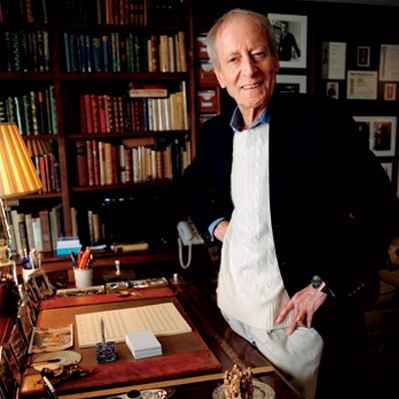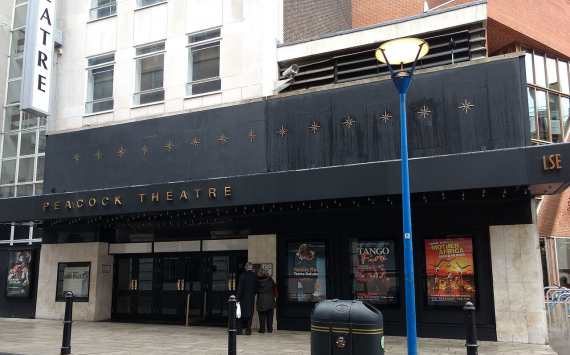
BARRY
John
English composer and conductor of film music
Date of Birth: 3 November 1933
Date death: 30 January 2011
Age at the time of death: 77 years old
Zodiac sign: Scorpio
Profession: Composer
Biography
John Barry Prendergast was an English composer and conductor of film music.
He composed the scores for eleven of the James Bond films between 1963 and 1987, as well as arranging and performing the "James Bond Theme" for the first film in the series, 1962's Dr. No. He wrote the Grammy- and Academy Award-winning scores to the films Dances with Wolves and Out of Africa, as well as the scores of The Scarlet Letter, Chaplin, The Cotton Club, The Tamarind Seed, Mary, Queen of Scots, Game of Death and the theme for the British television cult series The Persuaders!, in a career spanning over 50 years. In 1999, he was appointed with an OBE for services to music.
Born in York, Barry spent his early years working in cinemas owned by his father. During his national service with the British Army in Cyprus, Barry began performing as a musician after learning to play the trumpet. Upon completing his national service, he formed his own band in 1957, the John Barry Seven. He later developed an interest in composing and arranging music, making his début for television in 1958. He came to the notice of the makers of the first James Bond film Dr. No, who were dissatisfied with a theme for James Bond given to them by Monty Norman. Noel Rogers, the head of music at United Artists, approached Barry. This started a successful association between Barry and the Bond series that lasted for 25 years.
He received many awards for his work, including five Academy Awards: two for Born Free and one each for The Lion in Winter (for which he also won the first BAFTA Award for Best Film Music), Dances with Wolves and Out of Africa (both of which also won him Grammy Awards). He also received ten Golden Globe Award nominations, winning once for Best Original Score for Out of Africa in 1986. Barry completed his last film score, Enigma, in 2001 and recorded the successful album Eternal Echoes the same year. He then concentrated chiefly on live performances and co-wrote the music to the musical Brighton Rock in 2004 alongside Don Black.
In 2001, Barry became a Fellow of the British Academy of Songwriters, Composers and Authors, and, in 2005, he was made a Fellow of the British Academy of Film and Television Arts. Barry was married four times and had four children. He moved to the United States in 1975 and lived there until his death in 2011.
Early life and education
Barry was born John Barry Prendergast, in York, England, and was the son of an English mother and an Irish father. His mother was a classical pianist. His father, John Xavier "Jack" Prendergast, from Cork, was a projectionist during the silent film era, who later owned a chain of cinemas across northern England. As a result of his father's work, Barry was raised in and around cinemas in northern England and he later stated that this childhood background influenced his musical tastes and interests. He is the youngest of four children. He has two older brothers and one older sister. Barry was educated at St Peter's School, York, and also received composition lessons from Francis Jackson, Organist of York Minster.
Career
Serving in the British Army, Barry spent his national service playing the trumpet, taking a correspondence course (with jazz composer Bill Russo). Barry after national service worked as an arranger for Jack Parnell's and Ted Heath's orchestras forming his own band in 1957, the John Barry Seven, The John Barry Seven scored hit records on the EMI's Columbia label. These included "Hit and Miss", the theme tune he composed for the BBC's Juke Box Jury programme, a cover of the Johnny Smith song "Walk Don't Run", and a cover of the theme for the United Artists western The Magnificent Seven.
By 1959 Barry was gaining commissions to arrange music for other acts, starting with a young trio on Decca, coincidentally called the Three Barry Sisters, though unrelated both to Barry and the more famous The Barry Sisters duo in America. The career breakthrough for Barry was the BBC television series Drumbeat, when he appeared with the John Barry Seven. He was employed by EMI from 1959 until 1962 arranging orchestral accompaniments for the company's singers, including Adam Faith. He also composed songs (along with Les Vandyke) and scores for films in which Faith was featured. When Faith made his first film, Beat Girl (1960), Barry composed, arranged and conducted the film score, his first. His music was later released as the UK's first soundtrack album.
Barry also composed the music for another Faith film, Never Let Go (also 1960), orchestrated the score for Mix Me a Person (1962), and composed, arranged and conducted the score for The Amorous Prawn (also 1962). In 1962, Barry transferred to Ember Records, where he produced and arranged albums.
These achievements caught the attention of the producers of a new film called Dr. No (1962) who were dissatisfied with a theme for James Bond given to them by Monty Norman. Barry was hired and the result was one of the most famous signature tunes in film history, the "James Bond Theme". (Credit goes to Monty Norman, see here.) When the producers of the Bond series engaged Lionel Bart to score the next James Bond film From Russia with Love (1963), they discovered that Bart could neither read nor write music. Though Bart wrote a title song for the film, the producers remembered Barry's arrangement of the James Bond Theme and his composing and arranging for several films with Adam Faith. Lionel Bart also recommended Barry to producer Stanley Baker for his 1964 film Zulu. That same year Bart and Barry collaborated on the film Man in the Middle; and then, in 1965, Barry worked with director Bryan Forbes in scoring the World War II prison-camp drama King Rat.
This was the turning point for Barry, and he subsequently won five Academy Awards and four Grammy Awards, with scores for, among others, Born Free (1966), The Lion in Winter (1968), Midnight Cowboy (1969) for which he did not receive an on-screen credit, and Somewhere in Time (1980).
Barry was often cited as having had a distinct style which concentrated on lush strings and extensive use of brass. However he was also an innovator, being one of the first to employ synthesizers in a film score (On Her Majesty's Secret Service, also 1969), and to make wide use of pop artists and songs in Midnight Cowboy. Because Barry provided not just the main title theme but the complete soundtrack score, his music often enhanced the critical reception of a film, notably in Midnight Cowboy, The Tamarind Seed, the first remake of King Kong (1976), Out of Africa (1985), and Dances with Wolves (1990). Barry would often watch films and would note down with pen and paper what worked or what did not.
Barry composed the theme for the TV series The Persuaders! (1971), also known as The Unlucky Heroes, in which Tony Curtis and Roger Moore were paired as rich playboys solving crimes. The instrumental recording features the cimbalom (which Barry also used for The Ipcress File (1965) and other themes) and Moog synthesizers. The theme was a hit single in many European countries (including France, Germany, and the Benelux states), contributing to the cult status of the series in Europe, and the record featured Barry's The Girl with the Sun in Her Hair on the B side, an instrumental piece featured in a long running TV advert for Sunsilk shampoo. Barry also wrote the scores to a number of musicals, including the 1965 Passion Flower Hotel (lyrics by Trevor Peacock), the successful 1974 West End show Billy (lyrics by Don Black), and two intended Broadway musicals that never opened on Broadway, Lolita, My Love (1971), with Alan Jay Lerner as lyricist, and The Little Prince and the Aviator (1981), again with lyricist Don Black. Barry also composed the soundtrack for the Bruce Lee film Game of Death (1978).
In 2001, the University of York conferred an honorary degree on Barry, and in 2002 he was named an Honorary Freeman of the City of York.
During 2006, Barry was the executive producer on an album entitled Here's to the Heroes by the Australian ensemble The Ten Tenors. The album features a number of songs Barry wrote in collaboration with his lyricist friend, Don Black. Barry and Black also composed one of the songs on Shirley Bassey's 2009 album, The Performance. The song, entitled "Our Time Is Now", is the first written by the duo for Bassey since "Diamonds Are Forever".
Mentions in the news
Born in one day
(Rooster) .
Horoscope Scorpio: horoscope for today, horoscope for tomorrow, horoscope for week, horoscope for month, horoscope for year.















































